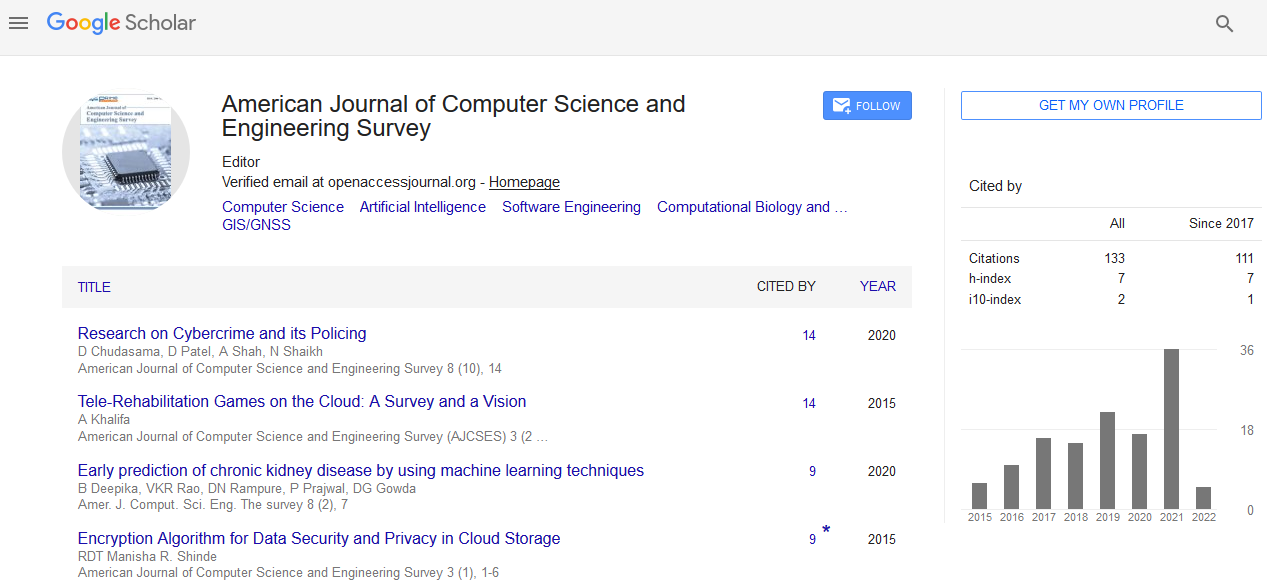Commentary - (2024) Volume 12, Issue 3
Revolutionizing Healthcare: The Role of AI Technologies in Hospitals
Liang Xu*
Department of Artificial Intelligence, Zhejiang University, China
*Correspondence:
Liang Xu,
Department of Artificial Intelligence, Zhejiang University,
China,
Email:
Received: 02-Sep-2024, Manuscript No. IPACSES-24-21240;
Editor assigned: 04-Sep-2024, Pre QC No. IPACSES-24-21240 (PQ);
Reviewed: 18-Sep-2024, QC No. IPACSES-24-21240;
Revised: 23-Sep-2024, Manuscript No. IPACSES-24-21240 (R);
Published:
30-Sep-2024, DOI: 10.36846/2349-7238.24.12.26
Description
Artificial Intelligence (AI) is transforming various sectors,
with healthcare being one of the most impactful areas of
application. In hospitals, AI technologies are enhancing patient
care, streamlining operations, and advancing medical research.
As these technologies continue to evolve, they promise to
reshape the future of healthcare, making it more efficient,
accurate, and personalized. This article explores the key AI
technologies being implemented in hospitals, their benefits,
challenges, and the future of AI in healthcare. Clinical Decision
Support Systems leverage AI to assist healthcare providers in
making informed decisions. These systems analyze patient
data, including medical history, symptoms, and test results,
to provide evidence-based recommendations. For example,
AI-powered CDSS can suggest diagnostic tests, treatment
options, and flag potential drug interactions, improving the
accuracy and speed of clinical decision-making. AI algorithms
are increasingly used to analyze medical images such as X-rays,
MRIs, and CT scans. Deep learning techniques, particularly
convolutional neural networks (CNNs), can detect anomalies
and diagnose conditions with high accuracy. AI-driven
imaging tools can identify early signs of diseases such as
cancer, enabling timely intervention and improving patient
outcomes. Predictive analytics harnesses AI to forecast
patient outcomes and trends based on historical data and
real-time information. Hospitals use predictive models to
anticipate patient admission rates, identify high-risk patients,
and manage resources more effectively. For instance, AI can
predict which patients are at risk of developing complications,
allowing for proactive care and personalized treatment plans.
Natural Language Processing is a branch of AI that enables
computers to understand and interpret human language. In
hospitals, NLP is used to process and analyze unstructured
data from electronic health records (EHRs), medical notes,
and research articles. This technology helps in extracting
relevant information, improving documentation accuracy, and
enhancing communication between healthcare providers.
Robotic surgery systems, often powered by AI, assist surgeons in
performing complex procedures with greater precision. These
systems offer enhanced dexterity, visualization, and control,
leading to reduced surgical errors, shorter recovery times,
and minimized invasiveness. AI algorithms can also optimize
surgical workflows and improve surgical outcomes. Virtual
health assistants, or chatbots, use AI to provide patients with
information and support. These virtual assistants can answer
questions about symptoms, medications, and treatment plans,
schedule appointments, and offer guidance on managing
chronic conditions. By handling routine inquiries, they free
up healthcare professionals to focus on more critical tasks. AI
contributes to the development of personalized medicine by
analyzing genetic, environmental, and lifestyle data to tailor
treatments to individual patients. AI algorithms can identify
genetic markers associated with specific diseases, predict drug
responses, and recommend personalized treatment plans,
enhancing the effectiveness of therapies and reducing adverse
effects. Collaboration between AI researchers, healthcare
professionals, and industry stakeholders will drive innovation
and address challenges in the field. Interdisciplinary research
will lead to the development of new AI applications and
solutions for complex healthcare problems. AI technologies
are revolutionizing hospitals by enhancing diagnostic accuracy,
improving patient care, and optimizing operations. As these
technologies continue to advance, they hold the potential
to transform healthcare delivery, making it more efficient,
personalized, and accessible. While challenges remain, ongoing
research, development, and collaboration will pave the way for
a future where AI plays an integral role in advancing medical
science and improving patient outcomes.
Acknowledgement
None.
Conflict Of Interest
None.
Citation: Xu L (2024) Revolutionizing Healthcare: The Role of AI Technologies in Hospitals. Am J Comp Science. 12:26.
Copyright: © 2024 Xu L. This is an open-access article distributed under the terms of the Creative Commons Attribution License, which permits unrestricted use, distribution and reproduction in any medium, provided the original author and source are credited.

